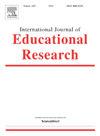Navigating the decolonial frontier: Leadership perspectives on epistemic justice in South African higher education
IF 2.5
3区 教育学
Q1 EDUCATION & EDUCATIONAL RESEARCH
引用次数: 0
Abstract
This paper critically examines the challenges of decolonising higher education in South Africa, focusing on the perceptions and experiences of academic leaders. Drawing on postcolonial and decolonial theories, it interrogates how Eurocentric frameworks continue to dominate curricula, institutional practices, and knowledge production, thereby marginalising African perspectives and epistemologies despite various decolonial initiatives. Using a qualitative approach, the study employed semi-structured interviews with five faculty deans from three South African universities, selected through purposive sampling, to capture nuanced insights into the obstacles faced in implementing decolonial reforms. The analysis generated key themes including: (i) narrow conceptualisation of decolonisation; (ii) institutional resistance to change; (iii) tensions between neoliberal priorities and decolonial imperatives; (iv) uncertainty surrounding alternative epistemic paradigms; and (v) the strategic navigation of contradictions by academic leaders. Findings reveal a disconnect between the rhetoric of decolonisation and its practical enactment. While progress has been made in diversifying student bodies and faculty demographics, these changes often remain symbolic, lacking substantive transformation of curricula or epistemic frameworks. Neoliberal imperatives, coupled with entrenched institutional cultures, further constrain efforts to advance African epistemologies. The persistent marginalisation of alternative knowledge systems underscores the difficulty of reimagining paradigms capable of disrupting Eurocentric dominance. The paper argues for a critical rethinking of decolonisation, one that goes beyond structural reforms to achieve epistemic justice and fully integrate African knowledge systems into higher education. It concludes that meaningful transformation demands both institutional commitment and a fundamental reimagining of knowledge production to create an inclusive and pluralistic academic landscape.
导航非殖民前沿:在南非高等教育认识正义的领导视角
本文批判性地考察了南非非殖民化高等教育的挑战,重点关注学术领袖的看法和经验。借鉴后殖民和非殖民理论,本书探讨了以欧洲为中心的框架如何继续主导课程、制度实践和知识生产,从而使非洲的观点和认识论边缘化,尽管有各种非殖民倡议。该研究采用定性方法,通过有目的的抽样,对来自三所南非大学的五位院长进行了半结构化访谈,以深入了解实施非殖民化改革所面临的障碍。分析产生的关键主题包括:(i)狭义的非殖民化概念;体制上对变革的抵制;新自由主义优先事项与非殖民化当务之急之间的紧张关系;(iv)围绕替代认知范式的不确定性;(五)学术领袖对矛盾的战略导航。调查结果显示,非殖民化的说辞与实际行动之间存在脱节。虽然在学生群体和教师人口结构多样化方面取得了进展,但这些变化往往只是象征性的,缺乏课程或认知框架的实质性转变。新自由主义的必要性,加上根深蒂固的制度文化,进一步限制了推进非洲认识论的努力。替代知识体系的持续边缘化凸显了重新构想能够颠覆欧洲中心主导地位的范式的难度。这篇论文主张对非殖民化进行批判性的反思,这种反思超越了结构性改革,以实现认识正义,并将非洲的知识体系完全整合到高等教育中。它的结论是,有意义的转型既需要制度承诺,也需要对知识生产进行根本性的重新构想,以创造一个包容和多元化的学术景观。
本文章由计算机程序翻译,如有差异,请以英文原文为准。
求助全文
约1分钟内获得全文
求助全文
来源期刊

International Journal of Educational Research
EDUCATION & EDUCATIONAL RESEARCH-
CiteScore
6.20
自引率
3.10%
发文量
141
审稿时长
21 days
期刊介绍:
The International Journal of Educational Research publishes regular papers and special issues on specific topics of interest to international audiences of educational researchers. Examples of recent Special Issues published in the journal illustrate the breadth of topics that have be included in the journal: Students Perspectives on Learning Environments, Social, Motivational and Emotional Aspects of Learning Disabilities, Epistemological Beliefs and Domain, Analyzing Mathematics Classroom Cultures and Practices, and Music Education: A site for collaborative creativity.
 求助内容:
求助内容: 应助结果提醒方式:
应助结果提醒方式:


